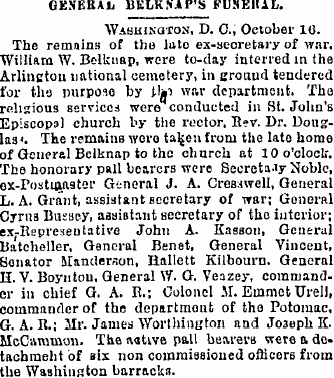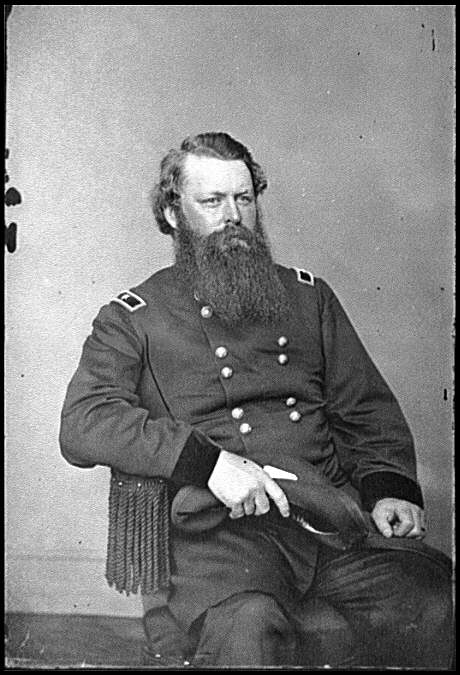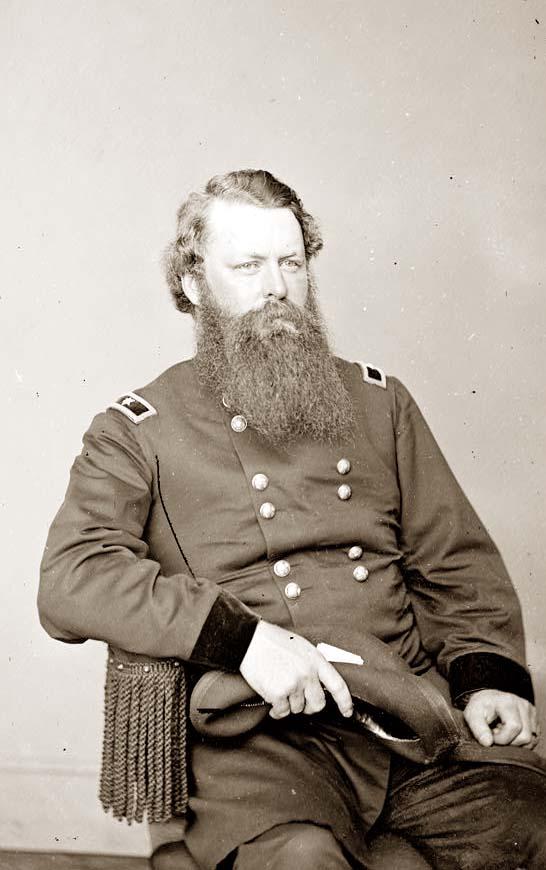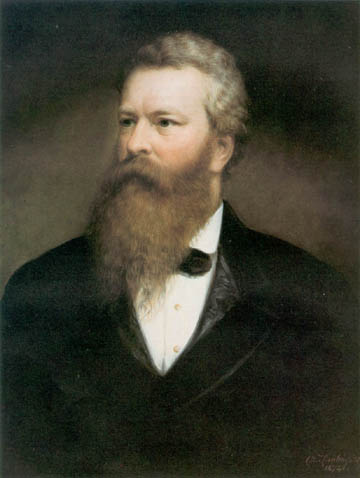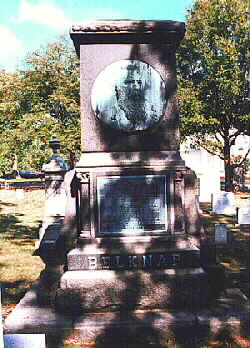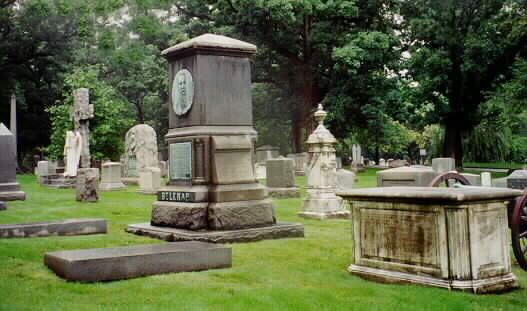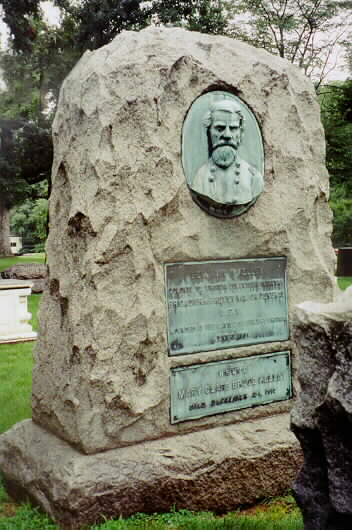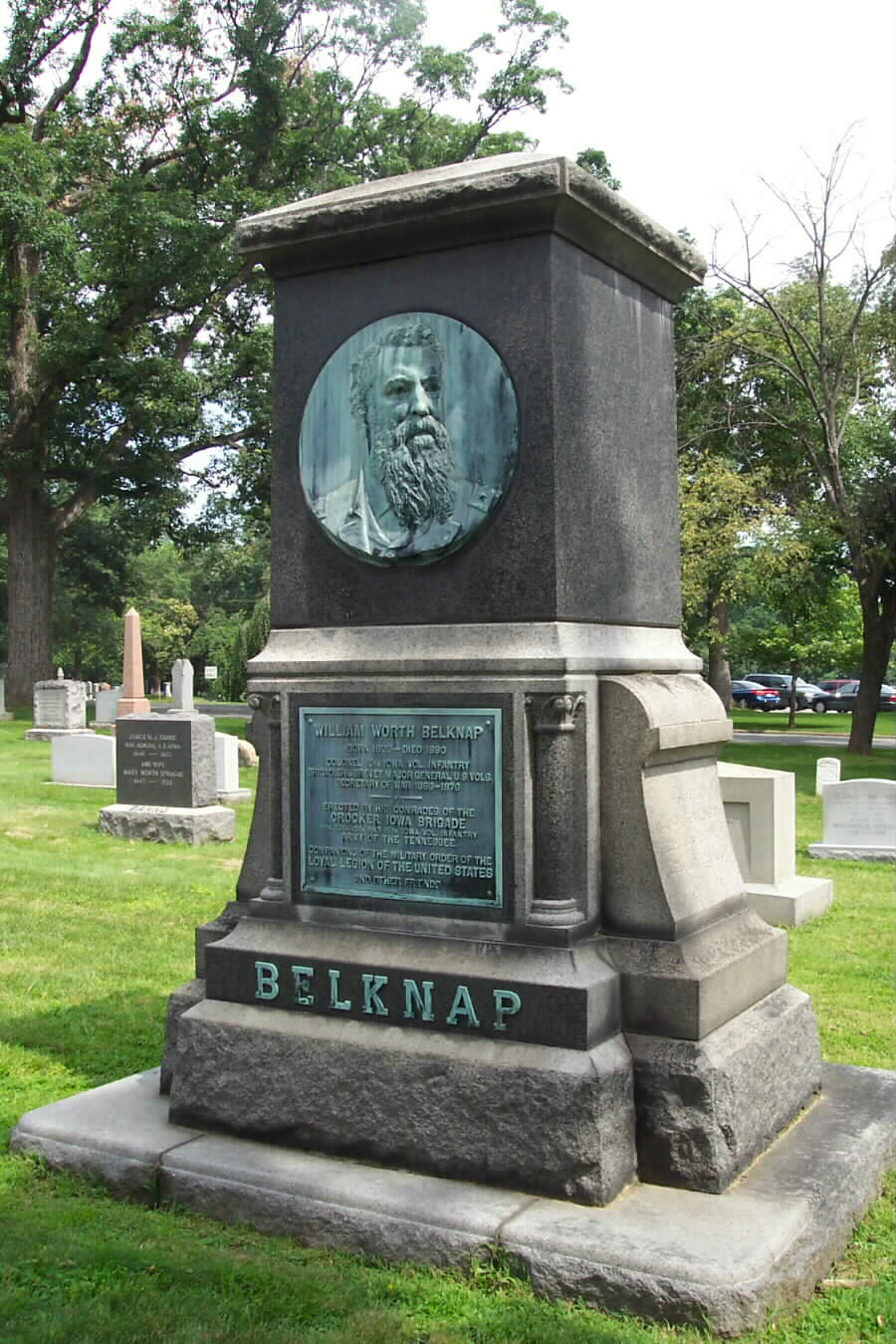William Worth Belknap of New York
Appointed from Iowa, Major, 15th Iowa Volunteer Infantry, 7 December 1861
Lieutenant Colonel, 20 August 1862
Colonel, 3 June 1863
Brigadier General of United States Volunteers, 30 July 1864
Breveted Major General of United States Volunteers, 13 March 1865, for gallant and meritorious services during the war
Honorably mustered out of the volunteer service, 24 August 1865
Secretary of War, 25 October 1869 to 2 March 1876
Died 12 October 1890
Born at Newburg, New York, on September 22, 1829, he attended the College of New Jersey and practiced law in Washington, D.C., then moving West.
In 1857 he was elected to the Iowa Legislature as a Democrat, but four years later supported President Lincoln’s war efforts.
On December 7, 1861,he was commissioned Major of the 15th Iowa Volunteer Infantry, in which he served with distinction, being wounded the following April at Shiloh. As Lieutenant Colonel of the regiment, he also performed with merit at Corinth, winning promotion to Colonel in June 1863. During the Vicksburg campaign he led the 15th Iowa Infantry in several engagements and was promoted to Brigadier General, United States Volunteers the following summer. Given command of the 3rd Brigade, 4th Division, XVII Corps, he was conspicious throughout the Atlanta Camapign, particularly in repulsing John B. Hood’s second sortie on July 22, 1864. On that field, according to the Division Commander, he “displayed all of the qualifications of an accomplished soldier.” Six days later, at Ezra Church, he provided timely support to an embattled XV Corps Division. In July 1865, following participation in Sherman’s March to the Sea and the Carolinas Campaign, he led the XVII Corps as Brevet Major General.
Returning to civilian life, he became Collector of Internal Revenue in Iowa and allied himself with the Republican Party, and in 1869 became Ulysses S. Grant’s Secretary of War. In March 1876, he was accused of malfeasance in office for accepting over $24,000 in bribes from a post trader seeking immunity from removal.
It is not clear whether he was aware of the arrangement or whether his wife had made the bargain and accepted the payoffs. Nevertheless, he was impeached by a unamious vote of the United States Senate, though at his formal trial the Senate fell short of the number of votes required to convict. By then he had resigned, which doubtless accounted for his acquittal.
In later years, he resided in Philadelphia, then practiced law in Washington, D.C.. He died in Washington on October 13,1890 and was buried in Section 1 of Arlington National Cemetery.
OCTOBER 22, 1890
BELKNAP’S SUDDEN DEATH
HIS LIFELESS BODY DISCOVERED
IN HIS ROOM
THE EX-SECRETARY OF WAR DIES
ALONE OF HEART DISEASE
HIS ARMY AND POLITICAL CAREERS
WASHINGTON, October 13, 1890 – General W. W. Belknap, Secretary of War during President Grant’s Administration, was found dead in his bed at about 10 o’clock this morning. It is believed that death occurred between 1 o’clock Saturday night and 9 o’clock Sunday morning.
For some time it had been the General’s habit to meet a few friends at the home of Dr. Hill, who lives less than a square away, for a social game of cards. Last Saturday night he was with them as usual and remained until nearly midnight, when he returned to his apartment in the Evans Building at 1490 New York Avenue, and presumably retired immediately. He was never again seen alive.
About 8:30 o’clock this morning John W. Cameron, his business associate, arrived at the building and, taking the mail for himself and the General from the box on the first floor, proceeded to the second floor where their offices and the General’s apartment are situated. He had separated the General’s mail from his own, which he began reading, when the servant girl who keeps the rooms in order rapped at the door and inquired if General Belknap was out of the city, saying that she had several times since Sunday morning tried the doors but found them locked.
Mr. Cameron, startled at what the girl had said immediately tried the doors himself but they were locked. The janitor was summoned and, bringing a stepladder, looked through the transom over the door leading from the public hall into the General’s sitting room. He could see the General’s hat on the table and his coat and waistcoat upon a chair standing nearby. The stepladder was then placed against the door leading into the bedroom. The bed was then seen, and the general lying partly uncovered on it. His left arm was bent rigidly toward the head was tightly clinched as though death had come while he was in a convulsion. The bedclothes were somewhat disarranged as if there had been a slight struggle for breath.
A physician was summoned and after making a brief examination he expressed the opinion that death had resulted from a stroke of apoplexy. The Coroner soon afterward arrived and took the body in charge. The autopsy disclosed the fact that the immediate cause of death was inflammation of the inner lining of the heart.
For some years General Belknap had been an almost constant sufferer from gout and in February last he had so severe an attack that he hardly left his room for three months or more. During that time he lost in flesh between thirty and forty pounds, and since then he had been in poor health. In consequence of his long illness his business had suffered and this had worried him at times. Mr. Cameron last saw the General at about 3 o’clock Saturday afternoon. He had been talking of his business affairs and seemed somewhat depressed, but before Mr. Cameron left him he had in a measure regained his usual cheerfulness.
Mrs. Belknap, who was at Newport and other Eastern seaside resorts during the summer months, but who has been in New York City during the last few weeks was summoned by telegraph, as was also the General’s son, Hugh, who lives in Chicago where he is employed in the offices of the Baltimore and Ohio Railroad Company.
As soon as the death of General Belknap was known at the War Department, Acting Secretary Grant ordered the flag on the building to be put at half mast in honor of the ex-secretary, and gave directions that the building be draped in black for the customary period. He also communicated with the family of the dead man to offer whatever assistance they might desire from the department in the arrangements for the funeral. As soon as the funeral arrangements are completed an order will be issued closing the department on the day of the funeral.
William Worth Belknap was born in Newburg, New York, September 22, 1829. He was the son of General William Goldsmith Belknap, who served with distinction in the War of 1812 and in the Florida and Mexican Wars. William Worth Belknap was graduated from Princeton College in the Class of 1848. He studied law in Georgetown, D.C. but was subsequently removed to Keokuk, Iowa, where he permanently located and practiced his profession in partnership with Ralph B. Lowe, who was afterward Governor of Iowa and Judge of the Supreme Court. At this time General Belknap was a Democrat and as such he was elected to the State Legislature. He served one term, that of 1867-8.
As the outbreak of the Civil War he entered the Army as a Major of the Fifteenth Iowa Infantry. He served with his regiment in the Army of the Tennessee, and participated in the battle of Shiloh, the siege and battle of Corinth, the siege of Vicksburg, the siege of Atlanta and the battles of Atlanta on July 21,22, and 23. After the capture of Atlanta, he marched with Sherman to the sea and finally to Washington. He had meantime risen through the grades and had been promoted to the rank of Brigadier General for special gallantry in the memorable battle of July 22 when he fought with his regiment from either side of the same line of breastworks. He was brevetted Major General March 13, 1865 and was mustered out August 24, 1865.
After the war he was appointed Internal Revenue Collector for the First District of Iowa, a position that he held from 1865 to October 13, 1869, when he was called into General Grant’s Cabinet as Secretary of War. He retained his office, through General Grant’s second Administration, until March 7, 1876 when he resigned in connection with charges of official corruption. He was impeached and tried before the Senate of the United States, the specific charges against him being that he had promised to appoint Caleb P. Marsh of New York to maintain a trading establishment at Fort Sill, Indian Territory, a military post of the United States, on consideration of a certain sum of money to paid quarterly to Belknap or Belknap’s wife.
The evidence showed conclusively that Marsh appointed one John B. Evans as his substitute after Marsh and Evans had entered into a written agreement for Evans to pay Marsh an annual sum of money in proportion to the number of soldiers quartered at the post. This contract was carried out with the knowledge and consent of Belknap as Secretary of War, and it was further proved that Evans paid the moneys to Marsh as agreed and that Marsh turned over to Belknap the larger portion of such moneys. This arrangement continued from October 10, 1870 to March 2, 1876 and the whole amount of money received from Marsh by Belknap in consequence of it was $24,450.
Belknap was represented before the Senate in answer to the impeachment by Matthew Carpenter, Judge Jeremiah B. Black, and Montgomery Blair, who pleaded that inasmuch as Belknap had resigned the office of Secretary of War before the articles of impeachment were drawn the Senate had no jurisdiction in the matter. On this technical plea Belknap escaped, thirty-five Senators voting that he was guilty and twenty-five voting to acquit him, it required a two-thirds vote for absolute conviction.
General Belknap spent the later years of his life in Washington. He was twice married, and his second wife, who was a Miss Tomlinson of Keokuk, surviving him.
BELKNAP, WILLIAM W., GEN., is the son of Gen. William G. Belknap, of the United States Army, who distinguished himself in the war of 1812, in the Florida war, and at Resaca and Buena Vista in the war with Mexico, and died in the service in 1851, Texas. He was born at Newburg, New York, in 1829, and, after attending the high school and academy there, and pursuing his studies in Florida, where his father was stationed, he entered Princeton College in 1846, and graduated in 1848. After studying law in Georgetown, D.C., and being admitted to the bar in Washington City, he went, in July, 1851, to Keokuk and commenced the practice of the law, shortly afterward forming a partnership with Hon. R.P. Lowe (who was soon after elected ) District Judge, and later Governor and Chief Justice of the Supreme Court of the State), and brought his mother and two sisters there in 1852. He was a member of the Legislature from Lee County, in 1857, as a representative of the Democratic party; but, being a strong Douglas Democrat, and not uniting with the members of that party who favored what was known as the Lecompton Constitution of Kansas, which was an important and exciting question in the politics of the party, he joined the Republican party. He was appointed Major of the 15th Iowa Vols., by Gov. Kirkwood, in 1861, of which regiment Gen. Hugh T. Reid was Colonel, and participated in that capacity in the battle of Shiloh, where he was wounded and had his horse shot under him. He remained in the army until the close of the war, rising gradually through the grades of Lieutenant Colonel and Colonel; was appointed Brigadier General of Volunteers, by President Lincoln, in 1864, on the recommendation of his commanders, Gens., Blair and Sherman, and was brevetted Major General in 1865 for gallant and meritorious services during the war. Having, as Brigadier General of Volunteers commanded the 3d Brigade, 4th Division, 17th Army Corps (Blair’s) of the army of the Tennessee (McPherson’s ); he was in numerous battles; among them, Shiloh, Corinth, the several battles near Atlanta, and the battle of Bentonville, N.C. He was engaged in the siege of Corinth, Vicksburg and of Atlanta, and commanded his Brigade (composed of the 11th,13th,15th, and 16th Iowa Regiments), under Sherman in his march from Altanta to the sea; thence to Goldsboro’, Raleigh and Washington. He was repeatedly mentioned for coolness and courage, and in the battle of Atlanta, July 22, 1864, he took prisoner Col. Lampley, 45th Alabama, by pulling him over the works, by his coat collar.
At the close of the war, he was appointed Collector of Internal Revenue for the 1st District of Iowa. On the accession of General Grant to the Presidency, he was offered the choice of either one of three important public positions in another State, and one at Washington, which he declined, and remained Collector of the 1st District (comprising the counties of Lee, Des Moines, Louisa, Washington, Jefferson, Van Buren, Henry, and Davis), until October, 1869, when he was appointed Secretary of War by President Grant, and his many friends point to the records of that office for the proof of his faithful labors for a term of over six years. Prior to this appointment, he was selected as the orator for the Army of the Tennessee at the re-union of all the Western armies, at Crosby’s Opera House, Chicago, December, 1868, and delivered the address at the great Re-union of Iowa soldiers, at Des Moines, in September,, 1870.
After his resignation of the office of Secretary of War, articles of impeachment were presented against him, and after a protracted and thorough trial, he was acquitted by the Senate.
General Belknap married, in 1854, Miss LeRoy, of Keokuk the sister of Mrs. Hugh T. Reid, and their son, Hugh Reid Belknap, is now a student at Phillips academy, Andover, Mass. His present wife, Amanda, whom he married in 1873, formerly Miss Tomlinson, of Harrodsburg, Kentucky, is the daughter of the late Dr. John Tomlinson, an able and famous physician of that locality. They have one child, a daughter, Alice Belknap. Since leaving the War Department Gen. Belknap has been engaged in legal practice; his residence is Keokuk but his business before the Departments at Washington, a large part of which results from his employment as attorney by several Railroad Corporations, requires him to be absent from home during a portion of each year.
BELKNAP, W W
- VETERAN SERVICE DATES: Unknown
- DATE OF DEATH: 10/12/1890
- DATE OF INTERMENT: Unknown
- BURIED AT: SECTION 1 SITE 132
ARLINGTON NATIONAL CEMETERY
BELKNAP, WM W
BMG US VOLS
- VETERAN SERVICE DATES: Unknown
- DATE OF DEATH: 10/12/1890
- DATE OF INTERMENT: Unknown
- BURIED AT: SECTION OS SITE LOT 132
ARLINGTON NATIONAL CEMETERY
BELKNAP, AMANDA T
- DATE OF DEATH: 06/26/1916
- DATE OF INTERMENT: 06/26/1916
- BURIED AT: SECTION 1 SITE 132
ARLINGTON NATIONAL CEMETERY
Jean Jacques Abram Van Kaathoven
Michael Robert Patterson was born in Arlington and is the son of a former officer of the US Army. So it was no wonder that sooner or later his interests drew him to American history and especially to American military history. Many of his articles can be found on renowned portals like the New York Times, Washingtonpost or Wikipedia.
Reviewed by: Michael Howard

